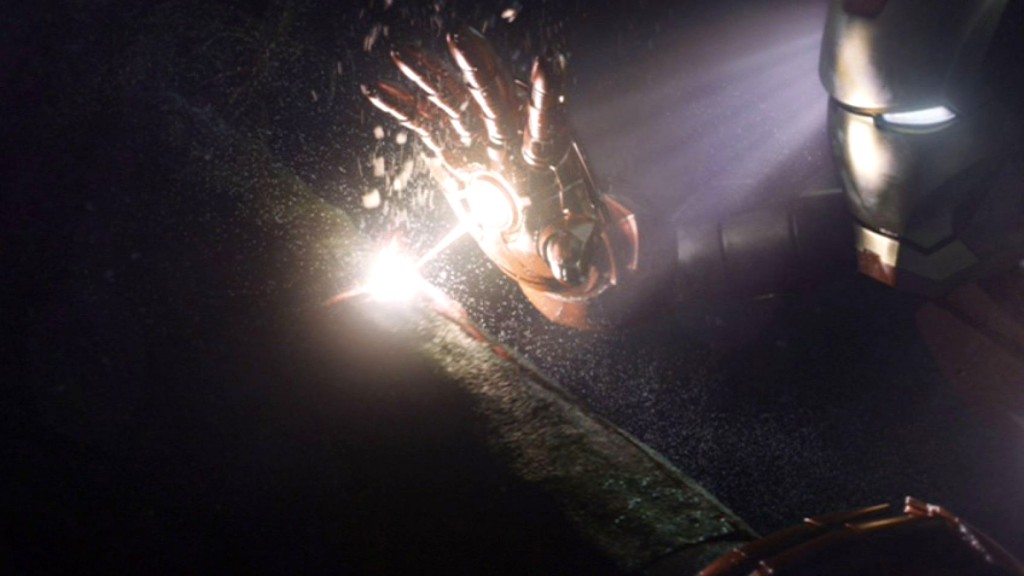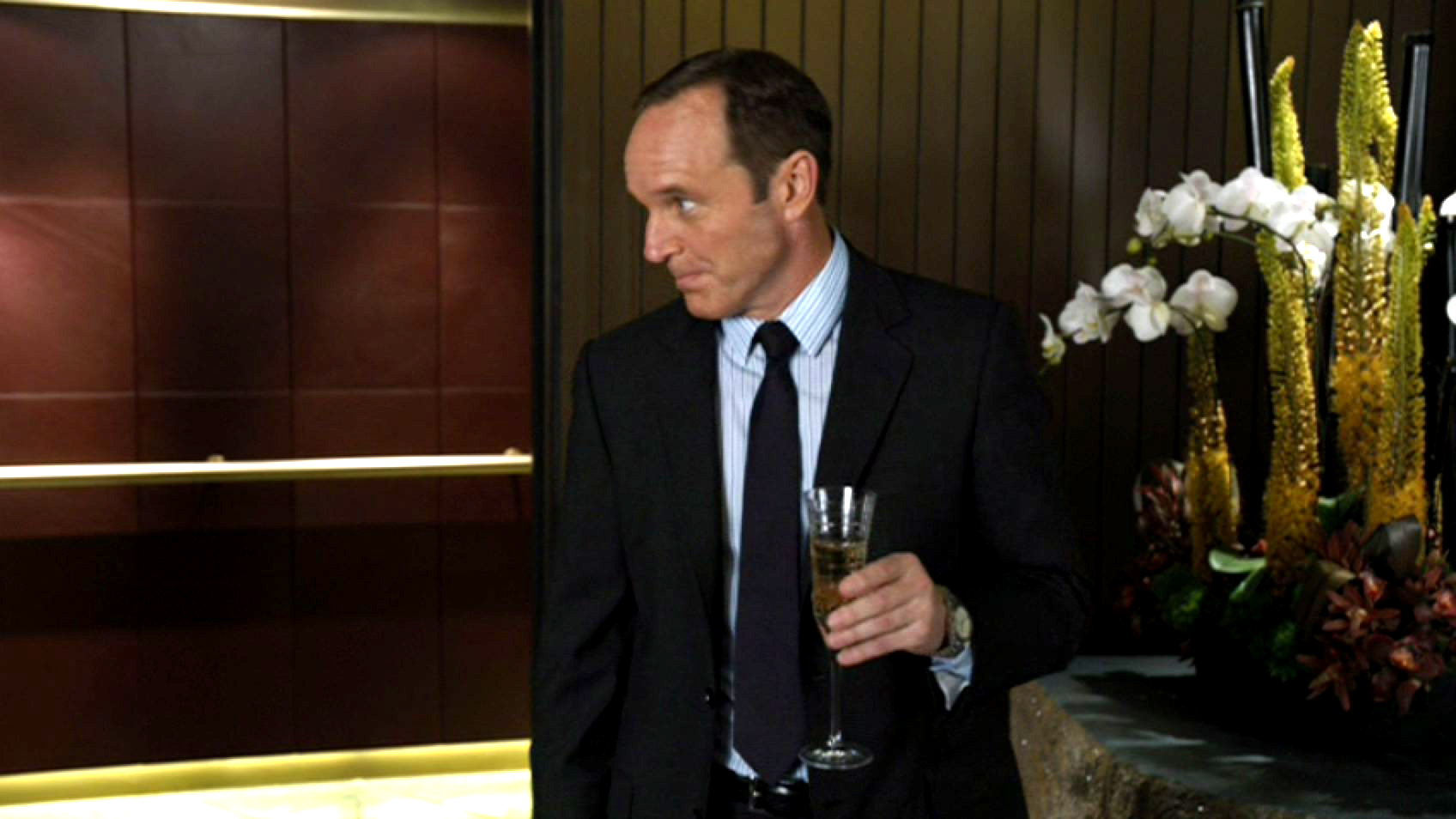The Avengers part 6
Perhaps the most impressive feature of The Avengers is the way it balances the separate stories of its wildly disparate leads, so that we never, ever feel like “Oh, another Thor scene, ho hum, I guess it will end soon.” The screenplay keeps so many balls in the air that everything feels lively and inventive and fun, even when the plot isn’t being forwarded, or especially when the plot isn’t being forwarded. The balance of the superheroes is so strong, here it is, twenty-three minutes into the movie and we are suddenly thinking “Oh yeah, Iron Man is in this movie too, I totally forgot.”
What does Tony Stark want? Tony Stark wants to show the world that the machine that powers his heart, and his suit — his life, really — the Arc Reactor, is also a viable energy source. “Energy,” in this instance, is just another word for “power,” and power is what superhero narratives are all about — who has it, who does not, who wants it and what they will do to get it. In the case of Iron Man, “power” defines the two sides of Tony’s life — he is both a weapons merchant, a power broker of the purest kind, and a power provider, with his Arc Reactor. He bets both sides of the coin, even if he stops selling weapons, he is still a weapon himself, a walking, thinking weapon.
Of defense, of course, which is always the problem of a superhero narrative — if the protagonist has more power than those around him, he must, must use that power in defense of those people. The trick is how to make that character interesting, to not make him a Boy Scout. Batman makes its protagonist obsessive and brooding, Hulk makes its protagonist an agonist who doesn’t want to use his powers at all, and Superman — well, that’s part of the reason why Superman is so hard to do in a cinematic narrative, he’s both a boy scout and resolutely unbeatable. Iron Man, on the other hand, makes its protagonist kind of a jerk — flawed, vain, conceited.
Who has power in The Avengers isn’t as interesting as who wants it, and who loves it. Thanos, apparently, has all the power in the universe, except for that one thing. The Other, it would seem, has as much power as any being could hope for — he towers over Loki, a freaking god already, and has armies at his disposal, but is a mere lackey in the presence of Thanos, and a bootlicker at that. Contrast him with Nick Fury, who also must report to a mysterious disembodied power, his committee, but who holds them at arm’s length, with distrust, and wants primarily to create a family. Then contrast Fury with Coulson, who is polite and diffident with Fury but holds a stunning amount of his own power, then contrast Coulson with Tony Stark, who treats Coulson like a teaching assistant he has to be nice to.
Coulson, “Phil,” to Tony’s girlfriend Pepper Potts, busts in on Tony and Pepper while they’re in the middle of a celebratory glass of champagne: Tony has made his first steps away from “bad” power and toward “good” power. Luckily for us, this hasn’t made him less of a jerk.
(That “Phil,” inserted as a tiny, tiny joke, intended to give the merest suggestion of a past between Pepper and Coulson, will have repercussions later, another example of how the smallest moments in The Avengers, delivered in the most casual ways, pay off.)
Coulson gives Tony a huge file to study and Pepper takes her leave, with a whispered promise of later sex. Coulson, stuck holding Pepper’s champagne flute, averts his eyes and looks uncomfortable. It’s an answer shot to him waiting on the phone while Black Widow beat up the Russians — Coulson, while jetting about saving the world, waits for super-spies to beat people up and then waits for billionaire industrialists to get sex talk from their girlfriends. It says the most about Coulson in the fastest way possible, again, humanizes him, in ways that will pay off later in the movie.
Who is Coulson, anyway, in the context of this drama? He wields enoromous power, he clearly outranks the individual heroes involved, and yet he doesn’t merely defer to them, he loves them, they mean the world to him. Coulson, in short, is the audience. If Fury is the writer/director, Coulson is the audience. But not just any member of the audience, he is the way all comics readers imagine themselves on an adventure with one of their heroes: the coolest sidekick ever. He’s blase, unassuming, patient, unflappable and openly adoring, as we see in a moment, when he gushes at Steve Rogers as they head out to the SHIELD carrier.
And here, at the thirty minute mark, we end Act I of The Avengers. The threat has been established, the team has been built (almost), the characters established. They’re in it now, whatever “it” is.


You make an excellent point that Coulson = audience. Whedon has a reputation for killing off his weakest characters. Now I want to go back and see if it’s the audience surrogates rather than strictly “the weak.”
I’m the world’s worst Whedon expert, but he keeps his audience surrogates alive until the last possible moment in Cabin in the Woods.
Cabin In the Woods is probably the only Whedon thing I’ve not seen, but I’m surprised at your description of the dead characters as ‘the weak.’ [SPOILERS FOR VARIOUS WHEDON UNIVERSES, with the universe names first so you can skip what you’ve not seen.]
In Firefly / Serenity – – – – – – – – – – – – Wash is certainly a ‘stronger’ fighter than Kaylee, a better pilot than Mal, and a stronger character than Simon (who is, perhaps, the ‘weakest’ overall, but there’s also not as much of an investment, not to mention killing him would be more implausible).
In Buffy – – – – – – – – – – – – Tara is seen as the strong emotional core, and a smart witch in her own right, one who taught Willow much about spells (not all of it was euphemism). Certainly Xander and Dawn would be more aptly named as ‘weak.’ In addition, Spike (arguably the most powerful vampire) and Anya (a revered demon) are also killed. Now, Anya is probably closest in the Whedonverse to an audience surrogate, as she still feels herself an outsider, adores some members of the group and never takes to others, follows along even when she disapproves, and is always bluntly spelling out what the characters refuse to acknowledge.
In Angel – – – – – – – – – – – – Doyle was half-demon, in addition to being a Seer. Winifred’s situation is a bit more complicated/absurd.
In Dollhouse – – – – – – – – – – – – well, I didn’t say *none* of them were weak.
I think that it’s a valid point about Whedon in general – I wouldn’t call it his weakest characters, but those characters who will have the most dramatic impact on the audience.
Consider the list of characters he’s killed in his various television series and spinoff films that haven’t been mentioned yet:
Wash (Firefly / Serenity) is very much an audience surrogate, because the entire audience relates to him more than any other character – primarily due to his sense of humor. His death is so shocking to fans precisely because they related to him the most.
Wesley (Buffy, then Angel) is the bumbling fool who wants to be included – he just loves the world and is such a know-it-all like some fans can be – who eventually turns into a dramatic lynchpin of the series. Just like every nerddom fanboy fantasized about. It makes sense that he did this at the end of the series, in order to drive it home that the series was over.
He’s killed plenty of other characters, but I think that the method to his madness is really more about getting to the audience, rather than character strength – and the easiest way to get to the audience is to make them care about something, then take it away.
Definitely agree about the dramatic impact. And you make a good point with Wesley; I think his character had become so mangled during Angel’s 4th season it may have lessened the impact slightly, but you’re right that he started as a joke but became a strong, beloved figure, especially in Angel.
I think it’s interesting that in Buffy, we first lose Joyce – who most of the target audience doesn’t identify with, but we identify with Buffy in the loss of her mother, so it’s very powerful – and then Tara, who has become both the mother-figure that Joyce was, but also much more personally beloved. She struggles with coming into her own, ‘fitting in,’ and loving Willow (another audience favorite) even through the addiction and danger.
So, the first time he took a familiar character while causing pain to a beloved character, but the second time he took a beloved character while causing great pain to beloved character: double whammy, and one of the most powerful (though also controversial) deaths in all of Whedon’s work. He definitely gets to the audience.